Outline
Christ condemned and crucified. (Verse 1-18.)
Christ on the cross. (Verse 19-30.)
His side pierced. (Verse 31-37.)
The burial of Jesus. (Verse 38-42.)
1 Then Pilate therefore took Jesus, and scourged him.
[Isa 53:5, Matt 27:26, Mark 15:15]
“scourge” – a full-size scourge was a whip with wide leather thongs in which pieces of metal and glass were embedded. Because such a beating was so severe, many prisoners died of this scourging and never made it to the cross alive. Note the mockery in vs. 2-3.
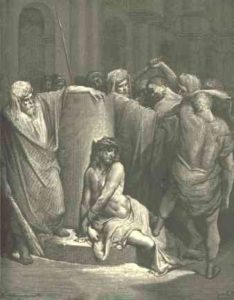
2 And the soldiers platted a crown of thorns, and put it on his head, and they put on him a purple robe,
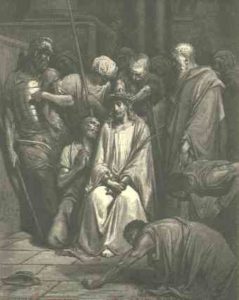
3 And said, Hail, King of the Jews! and they smote him with their hands.
Jesus was not surprised by Pilate’s actions, he knew what he would do before he ever did it. He knew the situation Pilate was in which in no way absolved him of his wrong doing. Pilate is ultimately responsible for allowing the beating and the mocking of the Son of God to go on.
The real criminal on this day was not the one who was about to be crucified but the ones who unjustly condemned him and Pilate for bowing to their pressure in spite of the fact he knew he was innocent.
4 Pilate therefore went forth again, and saith unto them, Behold, I bring him forth to you, that ye may know that I find no fault in him.
5 Then came Jesus forth, wearing the crown of thorns, and the purple robe. And Pilate saith unto them, Behold the man!
6 When the chief priests therefore and officers saw him, they cried out, saying, Crucify him, crucify him. Pilate saith unto them, Take ye him, and crucify him: for I find no fault in him.
7 The Jews answered him, We have a law, and by our law he ought to die, because he made himself the Son of God.
[Lev 24:16, Matt 26:66]
8 When Pilate therefore heard that saying, he was the more afraid;
9 And went again into the judgment hall, and saith unto Jesus, Whence art thou? But Jesus gave him no answer.
[Isa 53:7, Matt 26:63, Matt 27:12, 1st Pet 2:23]
10 Then saith Pilate unto him, Speakest thou not unto me? knowest thou not that I have power to crucify thee, and have power to release thee?
[Matt 26:62, Matt 27:13]
11 Jesus answered, Thou couldest have no power at all against me, except it were given thee from above: therefore he that delivered me unto thee hath the greater sin.
Now Pilate knows the truth, before him stood not only Israel’s Saviour, but Pilates very Creator and sustainer. Pilate wanted nothing more to do with Jesus.
12 And from thenceforth Pilate sought to release him: but the Jews cried out, saying, If thou let this man go, thou art not Caesar’s friend: whosoever maketh himself a king speaketh against Caesar.
“Caesar” was the king, or emperor, of the Roman empire – Pilate would have been one of Caesar’s many governors. The Jews are implying here that Jesus is guilty of treason by claiming to be “King of the Jews.” If Pilate refused to declare Jesus guilty, the Jews threatened to make sure that Caesar knew that Pilate was guilty of treason as well for not carrying out Roman law.
13 When Pilate therefore heard that saying, he brought Jesus forth, and sat down in the judgment seat in a place that is called the Pavement, but in the Hebrew, Gabbatha.
Herod was the king appointed by Rome to rule that area, he was not a Jew but rather an Edomite, who are the enemies of the Jews. Pilate was in charge of keeping the peace in that region.
Anyone claiming to be a king that was not approved by Rome would be seen as an enemy of Rome as well as anyone giving special treatment to them.
Pilate could lose his life if Rome were to listen to the Jews who were threatening him on that day
14 And it was the preparation of the passover, and about the sixth hour: and he saith unto the Jews, Behold your King!
[Gen 22:8, Isa 53:7, John 1:29, 1st Cor 5:7, 1st Pet 1:19, Rev 5:6]
“sixth hour” = noon
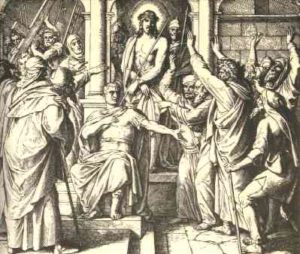
15 But they cried out, Away with him, away with him, crucify him. Pilate saith unto them, Shall I crucify your King? The chief priests answered, We have no king but Caesar.
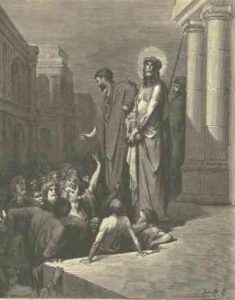
16 Then delivered he him therefore unto them to be crucified. And they took Jesus, and led him away.
17 And he bearing his cross went forth into a place called the place of a skull, which is called in the Hebrew Golgotha:
[Gen 22:6]
18 Where they crucified him, and two other with him, on either side one, and Jesus in the midst.
[Matt 27:38, Mark 15:27, Luke 23:32]
While Christianity is based on faith, it is not a blind faith. God has given the world a perfect description of the Saviour so when he arrived on the scene we could recognize him without a doubt because we see him described throughout the old testament.
Isaiah 53:4 Therefore will I divide him a portion with the great, and he shall divide the spoil with the strong; because he hath poured out his soul unto death: and he was numbered with the transgressors; and he bare the sin of many, and made intercession for the transgressors.
Then after the crucifixion Pilate sought to gain a little political clout at the expense of Jesus by mocking him with a sign that was sure to tell Rome how Pilate dealt with those who set themselves up as a king:
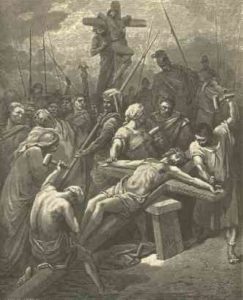
19 And Pilate wrote a title, and put it on the cross. And the writing was, JESUS OF NAZARETH THE KING OF THE JEWS.
20 This title then read many of the Jews: for the place where Jesus was crucified was nigh to the city: and it was written in Hebrew, and Greek, and Latin.
21 Then said the chief priests of the Jews to Pilate, Write not, The King of the Jews; but that he said, I am King of the Jews.
22 Pilate answered, What I have written I have written.
I don’t know for sure, but I am almost certain that Satan was smiling at this point, thinking he had won. I’ll bet he wished he could have been there physically to belittle Jesus as he hung on the cross along with the others.
Little did he know that Jesus came for this purpose and that by going to Calvary it was Satan who was defeated on that day.
23 Then the soldiers, when they had crucified Jesus, took his garments, and made four parts, to every soldier a part; and also his coat: now the coat was without seam, woven from the top throughout.
24 They said therefore among themselves, Let us not rend it, but cast lots for it, whose it shall be: that the scripture might be fulfilled, which saith, They parted my raiment among them, and for my vesture they did cast lots. These things therefore the soldiers did.
[Psa 22:18, Matt 27:35]
a fulfillment of Psalm 22:18, which says, “They part my garments among them, and cast lots upon my vesture.”
Psalms 22:13 They gaped upon me with their mouths, as a ravening and a roaring lion. 14 I am poured out like water, and all my bones are out of joint: my heart is like wax; it is melted in the midst of my bowels. 15 My strength is dried up like a potsherd; and my tongue cleaveth to my jaws; and thou hast brought me into the dust of death. 16 For dogs have compassed me: the assembly of the wicked have inclosed me: they pierced my hands and my feet. 17 I may tell all my bones: they look and stare upon me. 18 They part my garments among them, and cast lots upon my vesture.
25 Now there stood by the cross of Jesus his mother, and his mother’s sister, Mary the wife of Cleophas, and Mary Magdalene.
26 When Jesus therefore saw his mother, and the disciple standing by, whom he loved, he saith unto his mother, Woman, behold thy son!
27 Then saith he to the disciple, Behold thy mother! And from that hour that disciple took her unto his own home.
though it can not be proven conclusively, Joseph had probably died leaving Mary a widow; from the cross, Jesus insures that his mother is taken care of by “the disciple…whom he loved” (the Apostle John).
In case you are wondering why Jesus would have said such a thing to John, it is because Jesus’ half-brothers hadn’t been converted.
Jesus was giving John the authority to be her spiritual guide and to look out for her physical wellbeing. Jude and James later trusted him as their Saviour and probably resumed caring for his mother. They later wrote the epistles named after them.
28 After this, Jesus knowing that all things were now accomplished, that the scripture might be fulfilled, saith, I thirst.
29 Now there was set a vessel full of vinegar: and they filled a spunge with vinegar, and put it upon hyssop, and put it to his mouth.
a fulfillment of Psalm 69:21 – “They gave me also gall for my meat; and in my thirst they gave me vinegar to drink.”
30 When Jesus therefore had received the vinegar, he said, It is finished: and he bowed his head, and gave up the ghost.
31 The Jews therefore, because it was the preparation, that the bodies should not remain upon the cross on the sabbath day, (for that sabbath day was an high day,) besought Pilate that their legs might be broken, and that they might be taken away.
many people are under the false impression that Jesus died on a Friday. “Good Friday” however is nothing more than a manmade tradition. Jesus said in Matt. 12:40, “For as Jonas was three days and three nights in the whale’s belly; so shall the Son of man be three days and three nights in the heart of the earth.” Jesus plainly said that he would be dead and buried three days and three nights. One does not need to be good at maths to realise that there are not three days and three nights between Friday afternoon and Sunday morning. Please carefully note the details in the chart on the quiz sheet. The column on the left includes the days surrounding Jesus’ crucifixion in Jewish time (a Jewish day went from 6:00 pm to 6:00 pm) and the column on the right is in Gentile time (midnight to midnight). Every Saturday was the sabbath for the Jews in which they could do no work. Special holy days were sabbaths as well in which no work could be done. The verse we are looking at (19:31) points out that the upcoming sabbath day was not a regular sabbath day (ie a Saturday), but was rather “a high day” – specifically it was the Passover day. You will note from the chart that Jesus died on Wednesday evening at 6:00 pm – he had to be hurriedly buried (see John 19:41-42) because the Passover/sabbath was at hand. Thursday was the Passover/sabbath day. Friday was the first day of the Feast of Unleavened Bread (which was a sabbath day) and Saturday was the regular weekly sabbath day. Jesus rose from the dead Saturday evening at 6:00 pm (which would have been the beginning of the first day of the week – Sunday – in Jewish time). In John 20:1, Mary Magdalene came to the tomb before sunrise and it was already empty!
crucifixion was usually a very long and painful way to die. Quite often the victim would live for three or four days dying of thirst or exposure. With the Passover beginning at 6:00 pm, it was necessary to speed up the dying process, hence the legs of those being crucified were to be broken. With broken legs, the one on the cross could not support his weight enough to breathe and would suffocate.
32 Then came the soldiers, and brake the legs of the first, and of the other which was crucified with him.
33 But when they came to Jesus, and saw that he was dead already, they brake not his legs:
34 But one of the soldiers with a spear pierced his side, and forthwith came there out blood and water.
35 And he that saw it bare record, and his record is true: and he knoweth that he saith true, that ye might believe.
Before we dive into the question of where Jesus was during the three days that his body laid in the tomb, it is important to remind ourselves that it wasn’t a Centurion that caused Jesus’ death on that day and it wasn’t the Jews either.
It wasn’t the nails that pierced his hands and feet or the spear that was thrust in his side. It was Jesus alone who allowed himself to die that day. It was for our sins that Jesus lovingly went to the cross and gave his life freely for us:
John 10:17 Therefore doth my Father love me, because I lay down my life, that I might take it again. 18 No man taketh it from me, but I lay it down of myself. I have power to lay it down, and I have power to take it again. This commandment have I received of my Father.
How could mere mortals think that they could kill the one who is the giver of life? No, Jesus didn’t gradually expire because of the wounds to his body.
People were known to have survived crucifixion for up to three days before dying. When Jesus said, “It is finished” (that is, God’s work for him on earth), He willingly allowed himself to die.
When Jesus and one of the thieves died they went to a place called paradise, which is the same place called Abraham’s bosom in the gospel of Luke. There they awaited resurrection Sunday.
Luke records that the Centurion that was standing close by Jesus glorified God and said that Jesus was a righteous (innocent) man. Matthew says he said, “Truly this man was the Son of God.” Jesus told that thief that “Today thou shalt be with me in Paradise.”
All that were there that day saw many strange things that no doubt had affected what they thought about Jesus. Then the Son of God breathed his last breath. His death was as miraculous as his life.
All this occurred on Wednesday Evening on our calendar. At sunset it would have been the beginning of a new day, the sixth gay a Thursday evening to the Jews).
Remember in Genesis 1:5 that God said, the evening and the morning were the first day. We look at it the other way around in the western world.
At the beginning of the sixth day (our Thursday evening) even today in Israel, the people rush to the stores to buy the supplies they will need for the seventh day (Saturday) which begins for them on our Friday evening.
Sunday Monday Tuesday Wednesday Thursday Friday Saturday
1st day 2nd day 3rd day 4th day 5th day 6th day 7th day
At 6 PM on Friday the Jewish Saturday or sabbath begins.
Thursday is called the preparation day even unto this day. They cannot buy the next day because everything closes early on Friday (the sixth day) so that the people will make it home before the sabbath starts.
The reason why we have the additional day in there is because this was a feast and an additional sabbath is added to the week during this particular feasts.
The preparation day would also be one day earlier than usual thus making time for three days and three nights to elapse as Jesus had said it would that he would be in the heart of the earth.
There is no selling or buying allowed on the sabbath day and travel is restricted to just six tenths of a mile.
The thieves would have to be brought down from their crosses well before the sabbath day and be buried. So time for the Jews was of a necessity to allow them enough time to finish their work, shop, get home and prepare for the sabbath.
When there was a crucifixion on a Thursday the Jews would beg Pilate to allow the soldiers to break the legs of those who had been crucified to speed up their death.
Jesus’ legs were never broken, just as king David prophesied a thousand years earlier. How they could do that even to criminals just, so they could get home before the sabbath boggles the mind.
People were known to survive on the cross for up to three days, and no Jew would touch a dead body on the sabbath or do any work on that day.
Those that were still alive would have their legs broken, which would prevent them from pushing up with their feet on the nail and gasping for breath.
With their legs broken they would die in a manner of minutes by suffocation. If anyone appeared to be dead already, the soldiers would thrust a spear in their side just to make sure.
36 For these things were done, that the scripture should be fulfilled, A bone of him shall not be broken.
[Exod 12:46, Num 9:12]
the scripture referred to is Psalm 34:20 – “He keepeth all his bones: not one of them is broken.”
37 And again another scripture saith, They shall look on him whom they pierced.
[Zech 12:10, Psa 22:16]
the scripture referred to is Zechariah 12:10 – “And I will pour upon the house of David, and upon the inhabitants of Jerusalem, the spirit of grace and of supplications: and they shall look upon me whom they have pierced, and they shall mourn for him, as one mourneth for his only son, and shall be in bitterness for him, as one that is in bitterness for his firstborn.”
One has to wonder when reading the Psalm thirty-four if king David had any idea what he was saying when he uttered these prophetic words:
Psalm 34:20 He keepeth all his bones: not one of them is broken.
The reason why I say this is because if you will read the whole chapter, this verse looks like it has nothing to do with the rest of the chapter, but God knew what he was doing, and David was just along for the ride
38 And after this Joseph of Arimathaea, being a disciple of Jesus, but secretly for fear of the Jews, besought Pilate that he might take away the body of Jesus: and Pilate gave him leave. He came therefore, and took the body of Jesus.
[Matt 27:57, Mark 15:43, Luke 23:50]
Jesus was charged, convicted and sentenced to death in an illegal Jewish court that convened at night when many had already gone home.
Eighteen Jewish laws were broken that night to get rid of the troublemaker. Joseph of Arimathea and many others who would have argued on Jesus’ behalf were not told of this night court because the leaders didn’t want any interference from them.
Perhaps it was because the Sadducee’s and Pharisee’s parishioners were leaving them to follow Jesus that they had him killed. Scripture tells us that it was because of envy that Jesus was delivered unto Pilate in the first place:
39 And there came also Nicodemus, which at the first came to Jesus by night, and brought a mixture of myrrh and aloes, about an hundred pound weight.
40 Then took they the body of Jesus, and wound it in linen clothes with the spices, as the manner of the Jews is to bury.
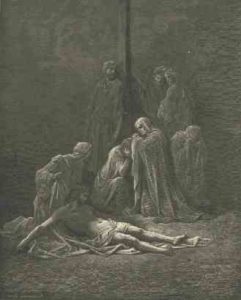
41 Now in the place where he was crucified there was a garden; and in the garden a new sepulchre, wherein was never man yet laid.
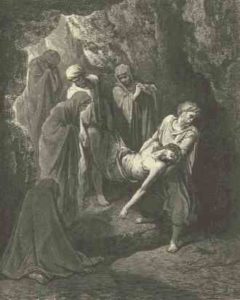
42 There laid they Jesus therefore because of the Jews’ preparation day; for the sepulchre was nigh at hand.
Because it was late on the preparation day Jesus’ body had to be buried near the place of his crucifixion. Normally they would have more time for burial if the crucifixion were to have taken place earlier in the week.
Joseph and Nicodemus could not have done it the next morning for obvious reasons. First because their superiors would not have allowed them the time off from their duties as a counselor (Joseph) and a ruler of the Jews (Nicodemus) to bury a troublemaking Rabbi. Secondly, for obvious hygienic reasons.
It would be a very unsanitary thing to leave him unburied until the next day even if he was wrapped in scented clothes. Lastly, because they would upset the Jews by burying him while they were preparing for the sabbath day.
But all things were done in accordance with God’s plans so that even in Jesus’ death he perfectly fulfilled the prophecies concerning him.
Another interesting thing to note is that when Jesus was brought into this world he was wrapped in swaddling clothes, the very same thing they used to wrap Jesus in for his burial. This, I believe, signified that Jesus was born to die.
Isn’t it amazing that the enemies of Jesus remembered His words about rising from the dead, but none of his disciples did?
The reason being is that Jesus didn’t want them to know yet because they probably would have left him prematurely, so Jesus withheld that information from them.
Why he wanted his enemies to remember his saying is clear. He knew they would do everything they thought was physically possible to prevent his teachings from spreading by placing guards at the tomb to prevent his disciples from stealing his body.
They unwittingly helped to make it next to impossible for Christianity to grow barring a miracle. Which is exactly what happened. Maybe they thought they could force him to remain in the tomb if he should actually rise from the dead.
Either way, Jesus was glorified, and then he had Pilate’s own guards as first-hand witnesses to the resurrection. Praise God! What man means for evil, God uses for good. Be sure to read the chapter which deals with the resurrection of Christ because as Paul said:
1 Corinthians 15:17 And if Christ be not raised, your faith is vain; ye are yet in your sins.
What significance was this event and was it just a one-time occurrence never to be repeated again? The bible has all the answers you need but you often have to probe to find them.
God could have just made everything plain and simple for us by laying everything out in chronological order, but He wants us to diligently study His Word to get to know Him more personally.
Notice that scripture points out that the bodies of the saints slept, not the saints themselves! All who die in Christ go immediately to be with the Lord.
Our bodies sleep awaiting the second resurrection, but our spirit and soul go immediately to be with Jesus in heaven. Remember the words of the apostle Paul in his second letter to the Corinthian church:
So there should be no controversy about which day Jesus was crucified (Wednesday or good Friday), because the scripture is clear that it was on Wednesday.
Jesus body went into the tomb and laid there for three days and three nights.
Day 1 = Wednesday Evening and all-day Thursday:
The preparation day
Day 2 = Thursday Evening and all-day Friday:
The high sabbath
Day 3 = Friday Evening and all-day Saturday:
The regular sabbath
The angel of the Lord must have left his perch on the stone just prior to the women arriving because he was not there, and neither were the keepers anywhere to be found at this time.
This is the last time that the angel of the Lord is mentioned as appearing to anyone concerning the resurrection.
John records Mary Magdalene’s actions while being silent about those that were with her, namely Mary the mother of James and Salome who is mentioned in Mark’s account.
Mark and John’s gospels are not in error, as the Liberals like to point out when discussing this “supposed” discrepancy, Mark had simply given more details than John did regarding this aspect of the resurrection.
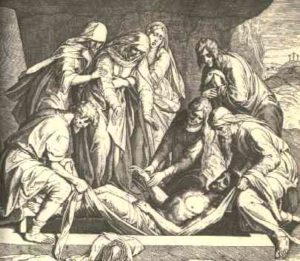
Commentary by Matthew Henry, 1710.
Verse 1-18 – Little did Pilate think with what holy regard these sufferings of Christ would, in after-ages, be thought upon and spoken of by the best and greatest of men. Our Lord Jesus came forth, willing to be exposed to their scorn. It is good for every one with faith, to behold Christ Jesus in his sufferings. Behold him, and love him; be still looking unto Jesus. Did their hatred sharpen their endeavours against him? and shall not our love for him quicken our endeavours for him and his kingdom? Pilate seems to have thought that Jesus might be some person above the common order. Even natural conscience makes men afraid of being found fighting against God. As our Lord suffered for the sins both of Jews and Gentiles, it was a special part of the counsel of Divine Wisdom, that the Jews should first purpose his death, and the Gentiles carry that purpose into effect. Had not Christ been thus rejected of men, we had been for ever rejected of God. Now was the Son of man delivered into the hands of wicked and unreasonable men. He was led forth for us, that we might escape. He was nailed to the cross, as a Sacrifice bound to the altar. The Scripture was fulfilled; he did not die at the altar among the sacrifices, but among criminals sacrificed to public justice. And now let us pause, and with faith look upon Jesus. Was ever sorrow like unto his sorrow? See him bleeding, see him dying, see him and love him! love him, and live to him!
Verse 19-30 – Here are some remarkable circumstances of Jesus’ death, more fully related than before. Pilate would not gratify the chief priests by allowing the writing to be altered; which was doubtless owing to a secret power of God upon his heart, that this statement of our Lord’s character and authority might continue. Many things done by the Roman soldiers were fulfilments of the prophecies of the Old Testament. All things therein written shall be fulfilled. Christ tenderly provided for his mother at his death. Sometimes, when God removes one comfort from us, he raises up another for us, where we looked not for it. Christ’s example teaches all men to honour their parents in life and death; to provide for their wants, and to promote their comfort by every means in their power. Especially observe the dying word wherewith Jesus breathed out his soul. It is finished; that is, the counsels of the Father concerning his sufferings were now fulfilled. It is finished; all the types and prophecies of the Old Testament, which pointed at the sufferings of the Messiah, were accomplished. It is finished; the ceremonial law is abolished; the substance is now come, and all the shadows are done away. It is finished; an end is made of transgression by bringing in an everlasting righteousness. His sufferings were now finished, both those of his soul, and those of his body. It is finished; the work of man’s redemption and salvation is now completed. His life was not taken from him by force, but freely given up.
Verse 31-37 – A trial was made whether Jesus was dead. He died in less time than persons crucified commonly did. It showed that he had laid down his life of himself. The spear broke up the very fountains of life; no human body could survive such a wound. But its being so solemnly attested, shows there was something peculiar in it. The blood and water that flowed out, signified those two great benefits which all believers partake of through Christ, justification and sanctification; blood for atonement, water for purification. They both flow from the pierced side of our Redeemer. To Christ crucified we owe merit for our justification, and Spirit and grace for our sanctification. Let this silence the fears of weak Christians, and encourage their hopes; there came both water and blood out of Jesus’ pierced side, both to justify and sanctify them. The Scripture was fulfilled, in Pilate’s not allowing his legs to be broken, Psalms 34:20. There was a type of this in the paschal lamb, Exodus 12:46. May we ever look to Him, whom, by our sins, we have ignorantly and heedlessly pierced, nay, sometimes against convictions and mercies; and who shed from his wounded side both water and blood, that we might be justified and sanctified in his name.
Verse 38-42 – Joseph of Arimathea was a disciple of Christ in secret. Disciples should openly own themselves; yet some, who in lesser trials have been fearful, in greater have been courageous. When God has work to do, he can find out such as are proper to do it. The embalming was done by Nicodemus, a secret friend to Christ, though not his constant follower. That grace which at first is like a bruised reed, may afterward resemble a strong cedar. Hereby these two rich men showed the value they had for Christ’s person and doctrine, and that it was not lessened by the reproach of the cross. We must do our duty as the present day and opportunity are, and leave it to God to fulfil his promises in his own way and his own time. The grave of Jesus was appointed with the wicked, as was the case of those who suffered as criminals; but he was with the rich in his death, as prophesied, Isaiah 53:9. these two circumstances it was very unlikely should ever be united in the same person. He was buried in a new sepulchre; therefore it could not be said that it was not he, but some other that rose. We also are here taught not to be particular as to the place of our burial. He was buried in the sepulchre next at hand. Here is the Sun of Righteousness set for a while, to rise again in greater glory, and then to set no more.
